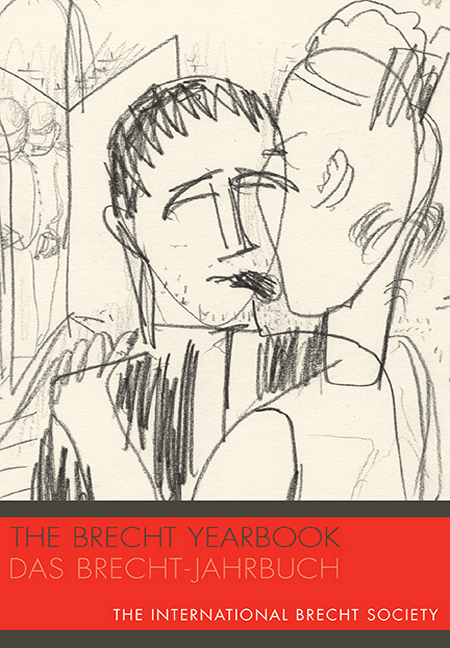Book contents
- Frontmatter
- Contents
- Editorial
- Tribute
- Documents from the Inaugural 24h DURCHEINANDER in Berlin
- Brecht-Images: Artist’s Introduction
- New Brecht Research
- The Temporality of Critique: Bertolt Brecht's Fragment Jae Fleischhacker in Chikago (1924–1929)
- Apparate und Körper: Überlegungen zu Bertolt Brechts Radiolehrstück Der Ozeanflug
- Wer ist Oscar? Ein unveröffentlichter Brief an Brecht vom 12. Juni 1918 aus schottischer Kriegsgefangenschaft
- “leg das buch nicht nieder, der du das liesest, mensch”: Brechts Gedicht “Die Nachtlager”
- Übersehen oder verbannt? Hanns Eislers Bilder aus der Kriegsfibel
- Special Insert: Accompaniments to Brecht, Music, and Culture
- Das “Wiedersehen”: Der chinesische Dichter und Germanist Feng Zhi und Bertolt Brecht
- Brechtian Challenges to Theater Artists during the Internal War in Peru
- “Good Woman should have been done in one of our big theaters long before this”: Brecht, the Students, and the Making of the New Wave of Australian Theater
- Mark Twain's “Magnanimous-Incident” Hero and Bertolt Brecht's Der gute Mensch von Sezuan
- Navid Kermani's Literary Reflections: On Kafka, Brecht, and the Koran
- Karl Kraus und Bertolt Brecht: Über die Vergleichbarkeit des Unvergleichlichen
- Book Reviews
- Notes on the Contributors
Navid Kermani's Literary Reflections: On Kafka, Brecht, and the Koran
from New Brecht Research
Published online by Cambridge University Press: 11 March 2017
- Frontmatter
- Contents
- Editorial
- Tribute
- Documents from the Inaugural 24h DURCHEINANDER in Berlin
- Brecht-Images: Artist’s Introduction
- New Brecht Research
- The Temporality of Critique: Bertolt Brecht's Fragment Jae Fleischhacker in Chikago (1924–1929)
- Apparate und Körper: Überlegungen zu Bertolt Brechts Radiolehrstück Der Ozeanflug
- Wer ist Oscar? Ein unveröffentlichter Brief an Brecht vom 12. Juni 1918 aus schottischer Kriegsgefangenschaft
- “leg das buch nicht nieder, der du das liesest, mensch”: Brechts Gedicht “Die Nachtlager”
- Übersehen oder verbannt? Hanns Eislers Bilder aus der Kriegsfibel
- Special Insert: Accompaniments to Brecht, Music, and Culture
- Das “Wiedersehen”: Der chinesische Dichter und Germanist Feng Zhi und Bertolt Brecht
- Brechtian Challenges to Theater Artists during the Internal War in Peru
- “Good Woman should have been done in one of our big theaters long before this”: Brecht, the Students, and the Making of the New Wave of Australian Theater
- Mark Twain's “Magnanimous-Incident” Hero and Bertolt Brecht's Der gute Mensch von Sezuan
- Navid Kermani's Literary Reflections: On Kafka, Brecht, and the Koran
- Karl Kraus und Bertolt Brecht: Über die Vergleichbarkeit des Unvergleichlichen
- Book Reviews
- Notes on the Contributors
Summary
Der Pass ist der edelste Teil von einem Menschen. Er
kommt auch nicht auf so einfache Weise zustand wie ein
Mensch. Ein Mensch kann überall zustandkommen, auf
die leichtsinnigste Art und ohne gescheiten Grund, aber
ein Pass niemals. Dafür wird er auch anerkannt, wenn er
gut ist, während ein Mensch noch so gut sein kann und
doch nicht anerkannt wird.
—Bertolt Brecht, FlüchtlingsgesprächePässe sind keine Ikonen, sondern Papiere.
—Navid Kermani, Wer ist Wir? Deutschland und seine MuslimeNavid Kermani has emerged as a major public intellectual in Germany, raising the nation's conscience particularly on questions of immigration and religious tolerance. Born in Siegen, Germany, as the son of Iranian parents, Kermani is an author of literary works and of essays, as well as a scholar of religion. He studied “Orientalistik” (Near Eastern Studies), philosophy, and drama in Cologne, Cairo, and then Bonn, where he completed his doctorate in 1998 and his Habilitation in 2005. Throughout his studies he worked in theaters, as a directorial assistant (“Regieassistent”) and later as dramaturge at the Schauspiel Frankfurt and the Theater an der Ruhr in Mülheim, a theater that played an important role in the development of migrant theater, especially Turkish-German theater, in the 1980s. (Mülheim, incidentally, is also the German city in which Brecht's Fatzer is set.) Besides writing journalistically for Der Spiegel, Die Zeit, Süddeutsche Zeitung, and Frankfurter Allgemeine Zeitung, among others, he is the author of an astounding variety of books. He authored creative prose works such as the children's book Ayda, Bär und Hase (2006) and novels such as Das Buch der von Neil Young Getöteten (2002), Dein Name (2011), or Große Liebe (2014). He wrote travel reports on his many voyages to the Middle East and North Africa that invite comparisons to the work of the Weimar-era “rasende Reporter” Egon Erwin Kisch. Kermani's journalistic writings and travel reports from regions in turmoil include the books Schöner neuer Orient: Berichte von Städten und Kriegen (2003) and Ausnahmezustand: Reisen in eine beunruhigte Welt (2013).
- Type
- Chapter
- Information
- The Brecht Yearbook / Das Brecht-Jahrbuch 40 , pp. 200 - 217Publisher: Boydell & BrewerPrint publication year: 2016



